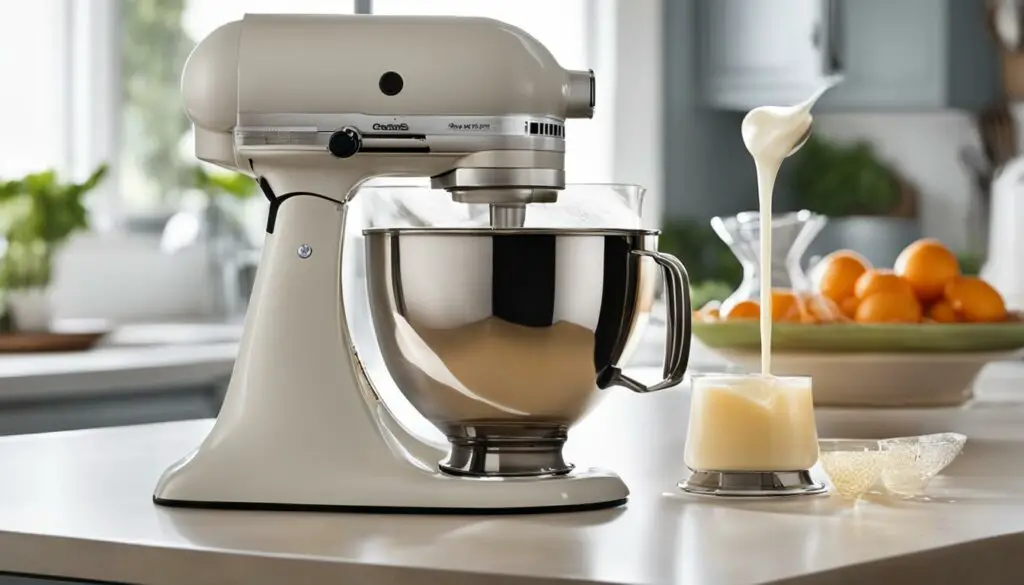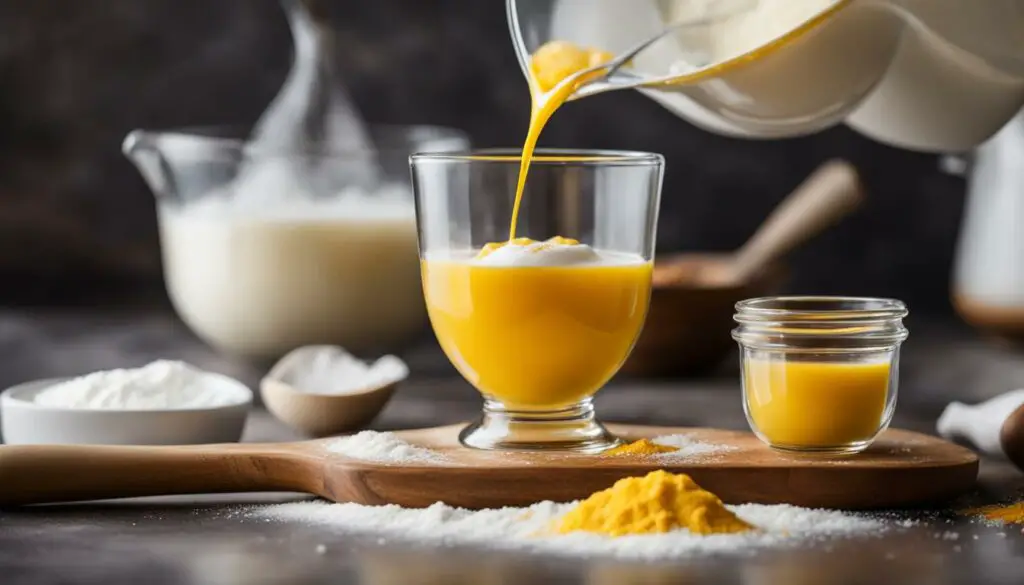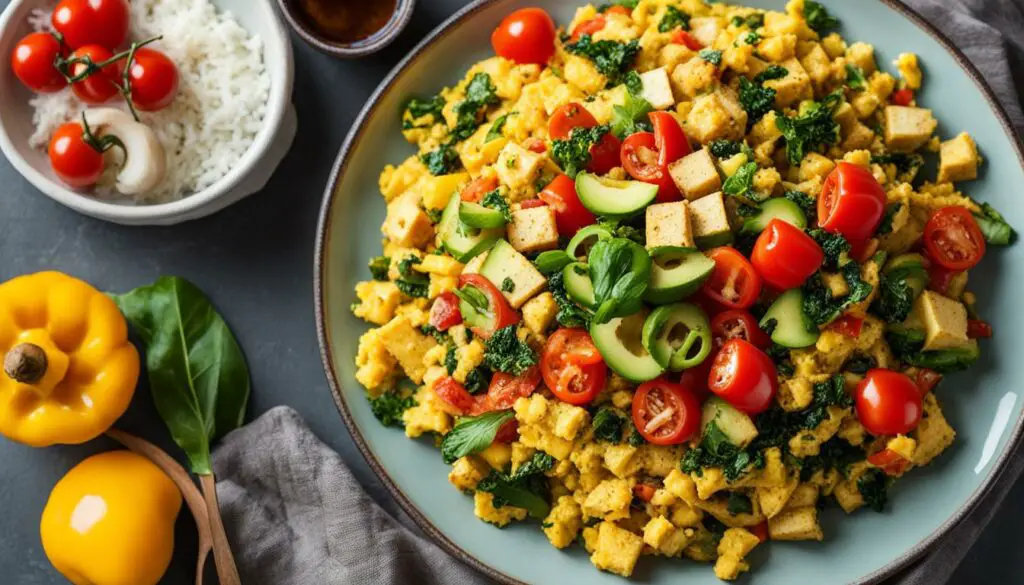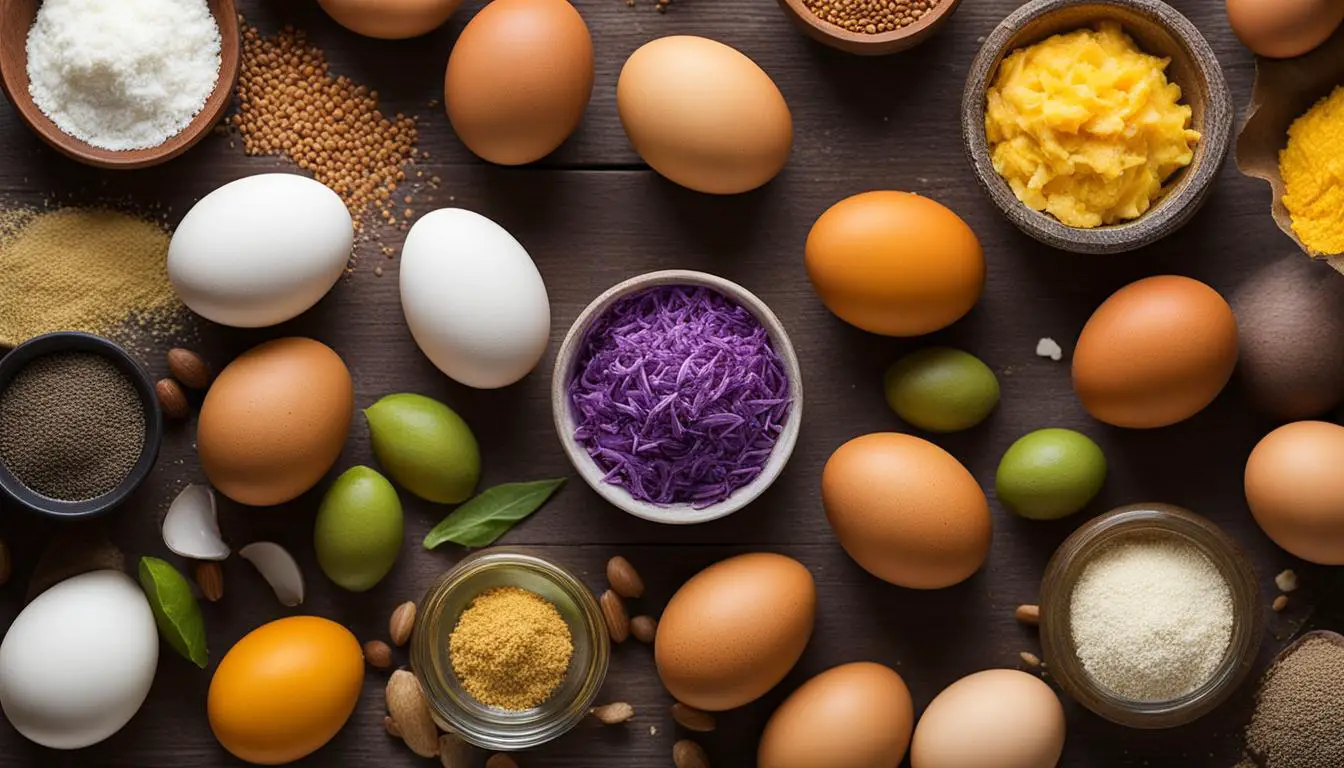Are you looking for alternatives to eggs in your recipes? Whether you follow a vegan diet, have dietary restrictions, or simply ran out of eggs, there are plenty of options available. In this article, we will explore a variety of substitutes that can be used in place of eggs in your cooking and baking endeavors. From plant-based egg replacers to healthy egg substitutions, we’ve got you covered.
Contents
- 1 Aquafaba – The Magical Egg Substitute
- 2 Vinegar + Baking Soda – The Rise You Need
- 3 Liquid Egg Replacement – Convenient and Easy
- 4 Tofu Scramble – A Healthy Breakfast Alternative
- 5 Flax Seeds + Warm Water – The “Flegg” Swap
- 6 Buttermilk – Perfect for Binding and Moisture
- 7 Vegetable Oil + Baking Powder + Water – Kitchen Staples Substitute
- 8 Yogurt – Binding and Moisture Enhancement
- 9 Carbonated Water – Surprisingly Effective Leavening Agent
- 10 Chia Seed + Water – The “Chegg” Binder
- 11 Conclusion
- 12 FAQ
- 12.1 What can I substitute for eggs in a recipe?
- 12.2 How can I use aquafaba as an egg substitute?
- 12.3 What is the vinegar and baking soda substitute for eggs?
- 12.4 Where can I find commercial egg replacements?
- 12.5 How can I make a tofu scramble as an egg substitute?
- 12.6 How do flax seeds act as an egg substitute?
- 12.7 How can buttermilk replace eggs in baking?
- 12.8 What is the vegetable oil, baking powder, and water substitute for eggs?
- 12.9 How can yogurt be used as an egg substitute?
- 12.10 How does carbonated water act as an egg substitute in baking?
- 12.11 How can chia seeds and water be used as an egg substitute?
- 13 Source Links
Key Takeaways:
- There are numerous substitutes available for eggs in recipes.
- Vegan egg substitutes, such as aquafaba and tofu scramble, are popular alternatives.
- Commercial egg replacements are convenient options that can be easily found in supermarkets.
- Flax seeds, chia seeds, and vinegar–baking soda combinations can act as effective binders and leavening agents.
- Buttermilk, yogurt, and carbonated water can provide moisture and leavening effects in baked goods.
Aquafaba – The Magical Egg Substitute

Aquafaba, the liquid from canned chickpeas, is a versatile egg substitute that can be used as a binder or whipped to create an egg-free meringue. Its unique properties make it an excellent option for those looking to avoid eggs in their recipes. Just 3 tablespoons of aquafaba can replace 1 egg, making it a convenient and accessible substitute that can be found right in your pantry.
What makes aquafaba so magical? It contains proteins and starches that mimic the effects of egg whites when whipped, creating a light and fluffy texture. This makes it a fantastic option for vegan bakers who still want to enjoy meringues, macarons, or other egg-based desserts. Aquafaba can also be used as a binding agent in recipes like cookies, cakes, and pancakes, ensuring the desired texture and structure without the need for eggs.
When using aquafaba in your recipes, keep in mind that its consistency can vary depending on the brand and can impact the final result. Some aquafaba may be more watery, while others can be thicker and have a stronger flavor. It’s important to experiment and adjust the amount of aquafaba in your recipes to achieve the desired outcome. Start with the recommended 3 tablespoons per egg, and then add or subtract as needed based on your specific recipe and personal preferences.
Vinegar + Baking Soda – The Rise You Need

In baking, eggs play a crucial role in helping your cakes and muffins rise and achieve that perfect texture. But what if you’re out of eggs or following a vegan or egg-free diet? Not to worry, vinegar and baking soda come to the rescue as a powerful leavening agent substitute. By combining 1 tablespoon of distilled white vinegar or apple cider vinegar with 1 teaspoon of baking soda, you can create a powerful egg replacement that can give your baked goods the rise they need.
Vinegar and baking soda work together to create a chemical reaction that produces carbon dioxide gas. This gas gets trapped in the batter, causing it to rise and create light and fluffy baked goods. It’s a tried and tested method that has been used in baking for years.
“The combination of vinegar and baking soda is a tried and true hack for replacing eggs in baking. It’s a fantastic option for those with dietary restrictions or simply when you’ve run out of eggs. Plus, the slight tanginess from the vinegar adds a unique flavor to your baked treats.”
When using vinegar and baking soda as an egg substitute, keep in mind that the mixture should be used quickly, as the leavening power diminishes over time. It’s best to add the vinegar and baking soda mixture to your recipe right before baking to ensure optimal results. Also, be aware that the slight tanginess from the vinegar may alter the taste of your final baked goods, so consider this when choosing recipes to substitute eggs with vinegar and baking soda.
Vinegar + Baking Soda Egg Replacement Ratio
| Vinegar | Baking Soda | Egg Equivalence |
|---|---|---|
| 1 tablespoon | 1 teaspoon | 1 egg |
Whether you’re following a vegan diet, have an egg allergy, or simply want to try something different, vinegar and baking soda can be a reliable substitute for eggs in your baking adventures. Experiment with this leavening agent substitute and enjoy creating delicious treats without the need for eggs.
Liquid Egg Replacement – Convenient and Easy

When it comes to finding a convenient and easy substitute for eggs, commercial egg replacements are a great option. These egg-free alternatives are readily available in most supermarkets, making them easily accessible for anyone looking to create egg-free recipes. With commercial egg replacements, there’s no need to worry about cracking shells or dealing with the mess that comes with using traditional eggs.
Commercial egg replacements have been specially formulated to mimic the texture and binding properties of eggs in recipes. They are designed to effectively replace eggs in a variety of dishes, including cakes, cookies, pancakes, and more. These substitutes can be used in both sweet and savory recipes, offering versatility in your cooking and baking endeavors.
Not only are commercial egg replacements convenient, but they are also an effective substitute. They provide the necessary binding and structure needed in recipes, ensuring your finished dish turns out just as delicious as if you were using traditional eggs. So whether you have dietary restrictions, allergies, or simply prefer to go egg-free, commercial egg replacements can help you create amazing dishes without compromising on taste or texture.
Table: Comparison of Commercial Egg Replacements
| Product | Features | Availability |
|---|---|---|
| Ener-G Egg Replacer | Plant-based, gluten-free, versatile | Widely available in supermarkets and online |
| Bob’s Red Mill Egg Replacer | Vegan, gluten-free, made with potato starch and tapioca flour | Available in natural food stores and online |
| Follow Your Heart VeganEgg | Plant-based, soy-free, cholesterol-free | Available in select supermarkets and online |
| Orgran No Egg | Gluten-free, vegan, made with potato and tapioca starch | Available in specialty food stores and online |
Table: Comparison of Commercial Egg Replacements
- Ener-G Egg Replacer: A versatile and gluten-free option that can be found in most supermarkets and online.
- Bob’s Red Mill Egg Replacer: Made with potato starch and tapioca flour, this vegan and gluten-free option is available in natural food stores and online.
- Follow Your Heart VeganEgg: A plant-based, soy-free, and cholesterol-free alternative that can be found in select supermarkets and online.
- Orgran No Egg: This gluten-free and vegan egg replacement, made with potato and tapioca starch, is available in specialty food stores and online.
These commercial egg replacements offer the convenience, availability, and effectiveness of replacing eggs in your recipes without the need for shells. They are a great option for anyone looking to create egg-free dishes without compromising on taste or texture.
Tofu Scramble – A Healthy Breakfast Alternative

Looking for a healthy and delicious breakfast alternative that’s also vegan? Look no further than tofu scramble. Made with extra-firm tofu, this egg-free option is packed with protein and can be customized with your favorite spices and veggies.
Tofu scramble is incredibly easy to prepare. Simply crumble the extra-firm tofu and sauté it with your preferred spices and vegetables. You can add onions, bell peppers, spinach, mushrooms, or any other ingredients to enhance the flavor and nutritional value of your scramble. Experiment with different combinations to find your perfect mix.
This healthy breakfast alternative is not only suitable for vegans but also for anyone looking to incorporate more plant-based options into their diet. It provides a satisfying and nutritious start to your day, and you can enjoy it on its own or with a side of toast, avocado, or fresh fruit.
Try this Tofu Scramble Recipe:
- Crumble one block of extra-firm tofu into a bowl.
- In a skillet, heat some olive oil or cooking spray over medium heat.
- Add your desired vegetables and sauté until they are tender.
- Add the crumbled tofu to the skillet and season with your favorite spices, such as turmeric, cumin, paprika, garlic powder, and nutritional yeast.
- Continue to cook and stir the mixture for about 5-7 minutes, until the tofu is heated through and lightly browned.
- Remove from heat and serve hot.
Enjoy this easy-to-make and healthy tofu scramble for breakfast or brunch. It’s a versatile dish that you can personalize to your taste preferences, making it a go-to option for a satisfying and nutritious start to your day.
Flax Seeds + Warm Water – The “Flegg” Swap

Flax seeds are a popular and effective egg substitute in baking, commonly referred to as “flax eggs” or “flegg.” When ground flax seeds are mixed with warm water, they form a thick and sticky mixture that acts as a binder in recipes. This makes flax seeds an excellent choice for vegan and egg-free baking.
To make a flax egg, combine 1 tablespoon of finely ground flax seeds with 3 tablespoons of warm water. Mix well and let the mixture sit for about 5 minutes until it thickens. The result is a gel-like substance that can replace 1 egg in your recipes.
“Flax eggs are a great alternative to traditional eggs, especially for people who follow a vegan or plant-based diet. The combination of ground flax seeds and water creates a thick mixture that helps bind your ingredients together, providing structure and moisture to your baked goods.”
When using flax eggs as a substitute, it’s important to note that the texture of the final product may be slightly different from that of recipes using traditional eggs. Baked goods made with flax eggs tend to be denser and have a nutty flavor. However, this substitution is particularly suitable for recipes like muffins, pancakes, and bread.
Benefits of Using Flax Seeds as an Egg Substitute:
- Rich in omega-3 fatty acids and fiber
- Gluten-free and suitable for gluten-sensitive individuals
- Cholesterol-free
- Plant-based and vegan-friendly
Experiment with flax seeds in your baking and discover a versatile and nutritious alternative to eggs. Whether you’re looking to accommodate dietary restrictions or simply want to try something new, flax eggs can be a fantastic addition to your culinary repertoire.
| Pros | Cons |
|---|---|
|
|
Buttermilk – Perfect for Binding and Moisture
Buttermilk is an excellent substitute for eggs when it comes to binding and adding moisture to your baked goods. With a tangy flavor, buttermilk enhances the texture and taste of your recipes. Replace 1 egg with 1/4 cup of buttermilk to achieve the desired results. It is important to note that buttermilk works best in recipes that already have another leavening agent at work, such as baking powder or baking soda.
When using buttermilk as an egg substitute, it helps to understand how it functions in your recipes. Buttermilk contains acid, which reacts with baking powder or baking soda to create carbon dioxide bubbles, resulting in a lighter and fluffier texture. Additionally, buttermilk’s richness and thickness add moisture to your baked goods, making them moist and flavorful.
To use buttermilk as an egg replacement, simply measure out 1/4 cup of buttermilk for each egg you need to replace. The buttermilk can be mixed directly into the other wet ingredients of your recipe. If you prefer a thicker consistency, you can add a tablespoon of cornstarch, arrowroot powder, or a similar thickening agent to the buttermilk before adding it to your recipe. This will help replicate the binding properties of eggs.
Buttermilk Substitution Chart
| Number of Eggs | Amount of Buttermilk |
|---|---|
| 1 | 1/4 cup |
| 2 | 1/2 cup |
| 3 | 3/4 cup |
| 4 | 1 cup |
Buttermilk can be a versatile ingredient in your cooking and baking arsenal. Experiment with its tangy flavor and creamy texture to create delicious egg-free recipes. Whether you’re making pancakes, biscuits, or cakes, buttermilk can provide the binding and moisture your recipes need, resulting in mouthwatering treats everyone will enjoy.
Vegetable Oil + Baking Powder + Water – Kitchen Staples Substitute
When it comes to baking, eggs are often used as a leavening agent to help your creations rise. But what can you do if you’re out of eggs or following a vegan or egg-free diet? Thankfully, there’s a simple substitute using common kitchen staples: vegetable oil, baking powder, and water. This combination can be a game-changer for quick breads like muffins and scones.
To replace one egg, you’ll need 1 1/2 tablespoons of vegetable oil, 1 teaspoon of baking powder, and 1 1/2 tablespoons of water. Simply mix these ingredients together and use the resulting mixture as a replacement for one egg in your recipe. The vegetable oil provides moisture, while the baking powder acts as a leavening agent, helping your baked goods achieve that light and fluffy texture.
This substitute is especially effective in recipes where eggs are the sole leavener. The combination of vegetable oil, baking powder, and water creates a reliable replacement that can produce delicious results. So, next time you find yourself without eggs but still craving some homemade baked goods, reach for your kitchen staples and give this substitute a try!
Yogurt – Binding and Moisture Enhancement
If you’re looking for a versatile and effective substitute for eggs, yogurt is a great option to consider. This creamy and tangy ingredient not only adds moisture to your baked goods but also helps with binding. One-fourth cup of yogurt can replace one egg in your recipes, making it a convenient choice for those with dietary restrictions or allergies.
Whether you’re making cakes, cookies, or muffins, yogurt can help create a tender and moist texture. It works particularly well in recipes that already have another leavening agent at work. The tanginess of yogurt adds a subtle depth of flavor to your baked goods, enhancing their overall taste.
“Yogurt is a versatile egg substitute that can add moisture and improve the texture of your baked goods.”
When using yogurt as an egg substitute, it’s essential to choose plain, unsweetened yogurt to avoid altering the flavor profile of your recipe. Greek yogurt or dairy-free yogurts are also suitable options. Experiment with different varieties and flavors to find the one that suits your taste and dietary needs.
Yogurt vs. Other Egg Substitutes
| Egg Substitute | Binding | Moisture Enhancement | Flavor |
|---|---|---|---|
| Yogurt | ✓ | ✓ | Subtle tanginess |
| Aquafaba | ✓ | ✓ | Neutral |
| Vinegar + Baking Soda | – | – | No effect |
| Flaxseed + Water | ✓ | – | Nutty flavor |
In comparison to other egg substitutes, yogurt offers the unique combination of binding and moisture enhancement. Aquafaba, the liquid from canned chickpeas, is another effective substitute that provides binding and moisture without adding much flavor to your baked goods. On the other hand, the vinegar and baking soda combination does not contribute to binding or moisture enhancement. Flaxseed and water create a binder but do not add additional moisture to the recipe.
Next time you find yourself without eggs or want to explore egg-free baking alternatives, reach for yogurt. Its versatility, binding properties, and moisture-enhancing capabilities make it an excellent choice for your favorite recipes.
Carbonated Water – Surprisingly Effective Leavening Agent
When it comes to baking without eggs, one surprising substitute you may not have considered is carbonated water. Not only does it add fizz to your favorite beverages, but it can also act as a leavening agent in your baked goods. With just 1/4 cup of carbonated water, you can replace 1 egg in your recipes and achieve light and fluffy results.
The bubbles in carbonated water create pockets of air in the batter, which helps the baked goods rise. This makes it an excellent option for recipes that already have other leavening agents at work, such as baking powder or baking soda. Whether you’re making cakes, muffins, or even pancakes, carbonated water can give your baked treats a boost.
To use carbonated water as an egg substitute, simply measure out 1/4 cup for each egg you need to replace. Add it to the rest of the wet ingredients in your recipe and mix well. The carbonated water will blend seamlessly into the batter, providing the leavening action necessary for a successful bake.
Benefits of Using Carbonated Water as an Egg Substitute:
- Light and fluffy texture: Carbonated water helps create a light and airy texture in your baked goods.
- No additional flavors: Unlike some other egg substitutes, carbonated water doesn’t add any additional flavors to your recipes.
- Readily available: Carbonated water is easily accessible and can be found in most grocery stores.
- Simple substitution: With a 1/4 cup of carbonated water replacing 1 egg, it’s a straightforward swap.
Using carbonated water as an egg substitute is a baking swap that may surprise you. Give it a try in your next recipe and experience the magic of light and fluffy baked goods without the need for eggs.
Chia Seed + Water – The “Chegg” Binder
Another popular egg substitute is the “chegg,” which is made using chia seeds and water. This combination creates a thick mixture that can act as a binder in recipes, making it an excellent option for quick breads and brownies. To replace 1 egg, simply mix 1 tablespoon of chia seeds with 1/3 cup of water and let it sit for 15 minutes to allow the seeds to absorb the water and form a gel-like texture.
Using the chia seed and water mixture as an egg substitute can result in baked goods with a slightly denser texture compared to traditional eggs. However, it still provides the necessary binding properties to hold your recipes together. So, if you’re looking for an egg-free option that can create a delicious and moist final product, give the “chegg” a try!
Now, let’s take a look at a table summarizing the key details of the chia seed and water egg substitute:
| Ingredients | Ratio | Preparation Time | Equivalent to 1 Egg |
|---|---|---|---|
| Chia Seeds | 1 tablespoon | 15 minutes | 1/3 cup water |
Benefits of Chia Seeds
Chia seeds are not only a great egg substitute but also offer several health benefits. They are rich in fiber, omega-3 fatty acids, and antioxidants. Additionally, they provide a good amount of protein, making them a valuable addition to a plant-based diet. Chia seeds also help add a nice crunch and texture to your recipes, enhancing the overall eating experience.
Incorporating chia seeds into your cooking and baking can be a nutritious way to boost the nutritional value of your dishes while still achieving the desired texture and structure without using eggs. So, don’t hesitate to experiment with this versatile ingredient and discover new ways to enjoy your favorite recipes!
Conclusion
Eggs are a versatile ingredient in cooking and baking, but there are many substitutes available for those who can’t or choose not to use them. Whether you’re vegan, have dietary restrictions, or simply ran out of eggs, there are plenty of options to explore. From aquafaba and vinegar-baking soda to tofu scramble and flax seeds, these alternatives can work wonders in your recipes.
Experiment with these substitutes to find the ones that work best for your dietary needs or kitchen emergencies. Aquafaba, the liquid from canned chickpeas, can be used as a magical egg substitute, and vinegar combined with baking soda can provide the rise you need in your baked goods. Tofu scramble is a healthy and delicious alternative to traditional egg scrambles, while flax seeds mixed with water create a “flegg” that acts as a binder.
Don’t forget about other options like commercial egg replacements, buttermilk, carbonated water, yogurt, and the “chegg” made from chia seeds. Each substitute brings its own unique qualities and can help you achieve the desired texture and taste in your dishes. So, don’t be afraid to get creative in the kitchen and enjoy cooking and baking without eggs. Happy experimenting!
FAQ
What can I substitute for eggs in a recipe?
There are several alternatives you can use in place of eggs when cooking or baking. Some options include aquafaba, vinegar and baking soda, commercial egg replacements, tofu scramble, flax seeds, buttermilk, vegetable oil, yogurt, carbonated water, and chia seeds.
How can I use aquafaba as an egg substitute?
Aquafaba, the liquid from canned chickpeas, can be used as a binder or whipped to create an egg-free meringue. 3 tablespoons of aquafaba can replace 1 egg in your recipes.
What is the vinegar and baking soda substitute for eggs?
The combination of 1 tablespoon of vinegar and 1 teaspoon of baking soda creates a leavening agent that can substitute 1 egg in your recipes.
Where can I find commercial egg replacements?
Commercial egg replacements are readily available in supermarkets and can be used in your favorite egg recipes.
How can I make a tofu scramble as an egg substitute?
For a healthy alternative to traditional egg scrambles, crumble extra-firm tofu, add spices and veggies of your choice, and sauté.
How do flax seeds act as an egg substitute?
Ground flax seeds, when mixed with warm water, create a thick mixture that acts as a binder in recipes. 1 tablespoon of finely ground flax seeds combined with 3 tablespoons of warm water can replace 1 egg.
How can buttermilk replace eggs in baking?
Buttermilk can be used as a substitute for eggs to provide binding and moisture to baked goods. 1/4 cup of buttermilk can replace 1 egg in your recipes.
What is the vegetable oil, baking powder, and water substitute for eggs?
To replace 1 egg, combine 1 1/2 tablespoons of vegetable oil, 1 teaspoon of baking powder, and 1 1/2 tablespoons of water.
How can yogurt be used as an egg substitute?
Yogurt can be used as a substitute for eggs to provide binding and moisture to baked goods. 1/4 cup of yogurt can replace 1 egg in recipes.
How does carbonated water act as an egg substitute in baking?
Using carbonated water as a substitute for eggs is a surprisingly effective baking swap, particularly when other leavening agents are being used in the recipe. 1/4 cup of carbonated water can replace 1 egg and help your baked goods rise.
How can chia seeds and water be used as an egg substitute?
When 1 tablespoon of chia seeds is combined with 1/3 cup of water and left to sit for 15 minutes, it creates a thick mixture that can replace 1 egg. Baked goods made with this substitute may have a slightly denser texture.









